It looks like you're using an Ad Blocker.
Please white-list or disable AboveTopSecret.com in your ad-blocking tool.
Thank you.
Some features of ATS will be disabled while you continue to use an ad-blocker.
share:
a reply to: ucanthandlethetruth
With regards to Bayrock and subsidiaries:
Open Corporates
I also note with great interest that in some of the legal papers you've excerpted Felix's last name is spelled, "Sater," whereas in others it is, "Satter." That one extra letter makes all the difference and indicates to me that this person potentially had multiple fictitious entities (names) under which he operated.
This stood out to me due to a past thread I authored titled, "MetroCare Home Services and T&M Protection Service, what do they have in common?," after the incident where Hillary collapsed and had to be manhandled into the special van she was being chauffeured around in during the 2016 campaign.
In the above thread, it was noted that the CEO of MetroCare/special advisor to the CEO of T&M Protection Services had been listed with his name spelled several different ways.
This thing of having the same name spelled slightly differently always stood out to me as being a hallmark of intelligence operatives.
With regards to Bayrock and subsidiaries:
United States flag BAYROCK CAPITAL GROUP, LLC (Arizona (US), 15 Sep 2003- , 6735 E GREENWAY #1078 SCOTTSDALE, AZ 85254)
United States flag BAYROCK GROUP L.L.C. (New York (US), 17 Jul 2001- , 160 VARICK ST, 2ND FLR, NEW YORK, NEW YORK, 10013)
United States flag BAYROCK GROUP, INC. (Delaware (US), 10 Jul 2007- )
United States flag branch BAYROCK MANAGEMENT GROUP LLC, THE (California (US), 5 Mar 2014- , 1173 RODEO DRIVE LOS ANGELES CA 90035)
United States flag BAYROCK MGM GROUP INC (Florida (US), 26 May 2017- )
United States flag inactive BAYROCK REALTY GROUP FLORIDA LLC (Florida (US), 13 Jul 2005- )
United States flag BAYROCK REALTY GROUP, INC. (New York (US), 23 Jul 2003- , 223 WOODSIDE DR, HEWLETT, NEW YORK, 11557) Previously/Alternatively known as BAYROCK REALTY GROUP INCORPORATED
United States flag BAYROCK REALTY GROUP, LLC (Massachusetts (US), 8 Aug 2006- , 112 CENTRAL AVENUE # 2, HYDE PARK,, MA, 02136)
United States flag inactive Bayrock Capital Group, LLC (Minnesota (US), 19 Jan 2010- , 210 N 2nd Str #501 Mpls, MN 55401 USA)
United States flag inactive Bayrock Realty Group LLC (New Hampshire (US), 27 Oct 2006- , 19 Michael Dr Danville NH 03819)
United States flag Bayrock Realty Group LLC (New Hampshire (US), 15 Dec 2015- , 17 Chichester Road Derry NH 03038)
United States flag THE BAYROCK MANAGEMENT GROUP LLC (Delaware (US), 28 Jan 2014- ) Trademarks: BAYROCK
Open Corporates
I also note with great interest that in some of the legal papers you've excerpted Felix's last name is spelled, "Sater," whereas in others it is, "Satter." That one extra letter makes all the difference and indicates to me that this person potentially had multiple fictitious entities (names) under which he operated.
This stood out to me due to a past thread I authored titled, "MetroCare Home Services and T&M Protection Service, what do they have in common?," after the incident where Hillary collapsed and had to be manhandled into the special van she was being chauffeured around in during the 2016 campaign.
In the above thread, it was noted that the CEO of MetroCare/special advisor to the CEO of T&M Protection Services had been listed with his name spelled several different ways.
This thing of having the same name spelled slightly differently always stood out to me as being a hallmark of intelligence operatives.
Yes, I agree.
These are all of the known names Sater has gone by in the past. I've not been able to research all of these names yet. Just his Felix Sater name is a lot of material, as far as the public lawsuits and media articles.
1. Felix Mikhailovich Sheferovsky
2. Felix Satter
3. Felix Slater
4. Felix Sader
5. Haim F. Sater
6. Hai Ying Sater
Hoping to get to researching these other names in various search engines soon.
These are all of the known names Sater has gone by in the past. I've not been able to research all of these names yet. Just his Felix Sater name is a lot of material, as far as the public lawsuits and media articles.
1. Felix Mikhailovich Sheferovsky
2. Felix Satter
3. Felix Slater
4. Felix Sader
5. Haim F. Sater
6. Hai Ying Sater
Hoping to get to researching these other names in various search engines soon.
Where the Sater-Bayrock lawsuit gets interesting is where it tells "the story" which begins on [p. 17]
Source
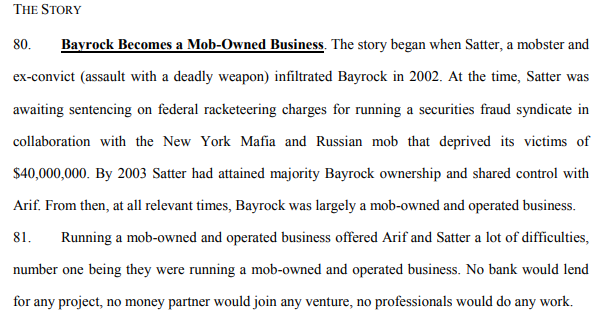

While I'm not going to screenprint it all, I'll try to highlight what I think is noteworthy regarding FL Group-Bayrock.

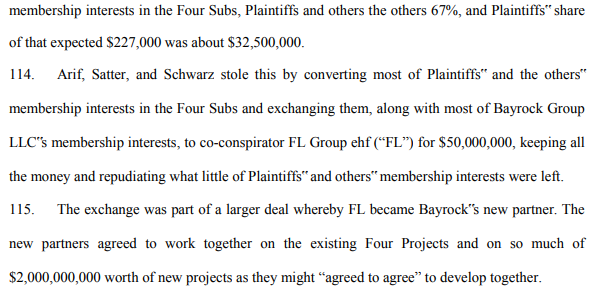
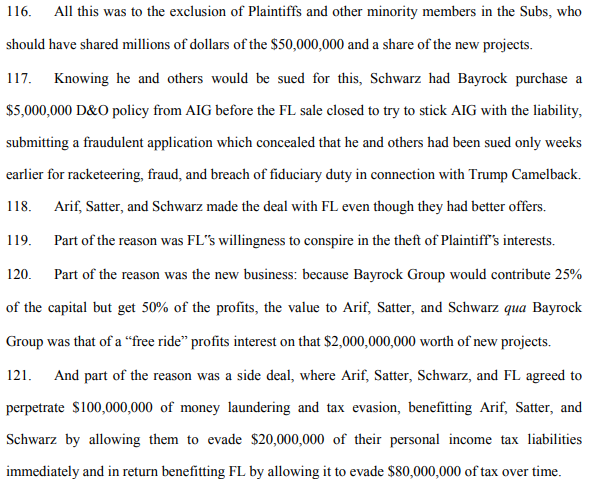
Again, we learn FL Group was specifically chosen, even when Bayrock had received better offers.
In a footnote at the bottom of p. 140, we get additional details this preference to FL Group had to do with Putin.
Oh okay. Well, way to be super f#cking clear.
Disclosure by whom? Is this fact or not? Ugh
I'll add more either tonight or this weekend.
Source


While I'm not going to screenprint it all, I'll try to highlight what I think is noteworthy regarding FL Group-Bayrock.



Again, we learn FL Group was specifically chosen, even when Bayrock had received better offers.
In a footnote at the bottom of p. 140, we get additional details this preference to FL Group had to do with Putin.
During the early FL negotiations, Bayrock was approached by Novator, an Icelandic competitor of FL's, which promised to go into the same partnership with Bayrock as FL was contemplating, and at better terms. Arif and Satter told Kriss this would not be possible because the money behind these companies was mostly Russian and the Russians behind FL were in favor with Putin, but the Russians behind Novator were not, and so they had to deal with FL. Whether or not this was true and what further Russian involvement existed must await disclosure.
Oh okay. Well, way to be super f#cking clear.
Disclosure by whom? Is this fact or not? Ugh
I'll add more either tonight or this weekend.
edit on 3-5-2019 by ucanthandlethetruth because: typo
Many of the next pages allude to the tax fraud and tax evasion and alleged money laundering. I only understand maybe 70% of it. What I found to be
interesting next is on [p. 154]
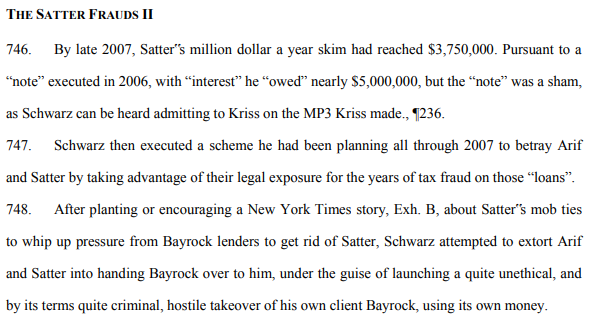
What is interesting about all this is:
1) Either Schwarz knew Sater was an asset for the FBI and burned him anyway, or
2) Schwarz only knew about his mob ties but not the asset part and burned Sater with the leaked story to the press but Sater figured out how to use it his advantage with Ablyazov (at least according to the earlier post about the other BTA Bank lawsuit)
3) Sater knew he was going to be meeting Ablyazov at the wedding Sept 2007 and asked Schwarz to leak the mob ties story to the media (Dec 2007) so he could use it to gain Ablyazov's trust

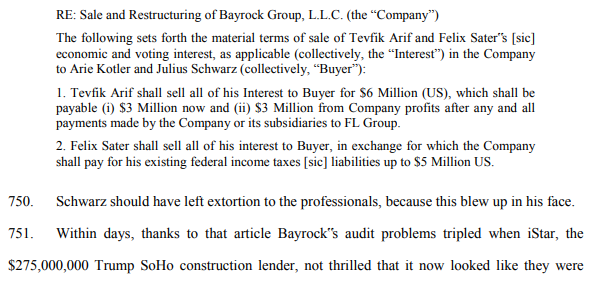
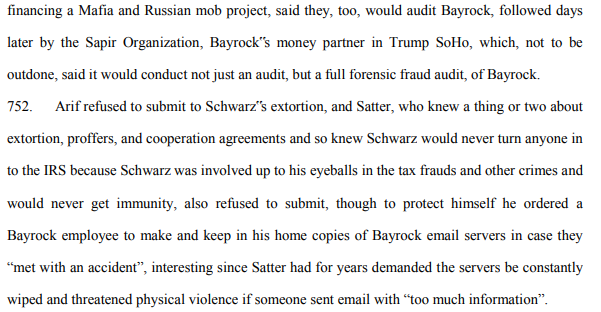
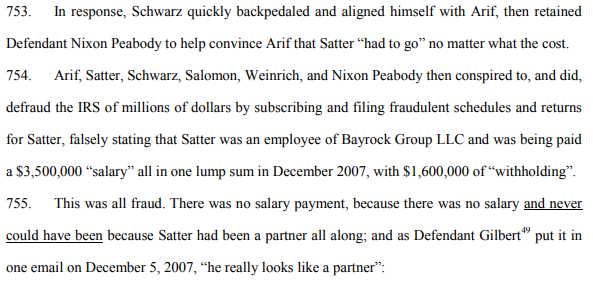
And another interesting footnote I will type out because the font is so small.
What I found also worthwhile to note having read/skimmed in parts all 165 pages of this 2010 lawsuit brought by Jody Kriss, the real estate developer (pictured in a previous post who feared for his life from Sater) is these crimes were allegedly purported to take place 2006-07. At least the ones that matter to this thread pertaining to FL Group and Sater. The lawsuit claims it's a mob fronted business from the get-go (2002), but it's 2019 and no criminal charges. No indictments. This lawsuit ended up settled out of court.
I mean, this dude Kriss was a thorn in Sater's side for almost a decade. Apparently Trump's, too, given the hundreds, likely thousands, of "Trump Sater Russia" media articles one could source.

This headline is from Feb 22, 2018.
It was March 12, 2018 the two respected reporters from Buzzfeed (weird, I know, but they do have solid reps) vetted Sater's story and published his coming out as an asset for the FBI/CIA/DIA/who knows.
Bloomberg
We learn Kriss discarded a lot of his claims about the things he alleged Bayrock did and the terms of the settlement weren't officially disclosed. It's almost like this guy paid legal and lawyer fees on multiple charges the judge had knocked down to only a racketeering case and after eight years finally settled privately. Yet not even a month later, Sater is offically outed, he's already leaked his story to Buzzfeed and knows his cover is blown and the judge in the other case (Forbes media Motion to Intervene) ruling Sater's files could no longer be kept sealed. I would harbor a guess this Kriss guy didn't care as much about his alleged lost profits as he wanted to destroy Sater's cover after he figured out he was an asset.

What is interesting about all this is:
1) Either Schwarz knew Sater was an asset for the FBI and burned him anyway, or
2) Schwarz only knew about his mob ties but not the asset part and burned Sater with the leaked story to the press but Sater figured out how to use it his advantage with Ablyazov (at least according to the earlier post about the other BTA Bank lawsuit)
3) Sater knew he was going to be meeting Ablyazov at the wedding Sept 2007 and asked Schwarz to leak the mob ties story to the media (Dec 2007) so he could use it to gain Ablyazov's trust




And another interesting footnote I will type out because the font is so small.
Nixon Peabody was also involved with yet another tax fraud. Right after the FL deal closed, the first transaction Bayrock and FL did together as new partners through Bayrock/FL Holdings was to acquire a significant piece of a Florida development project from Michael Samuel. FL put in its 75%, about $25,000,000, and Bayrock put in its 25%, about $8,000,000. Of that $8,000,000, Bayrock contributed $5,000,000 in cash and the little 5% piece of Midtown Miami that started everything years ago, the piece for which Arif had put up the $450,000. Bayrock contributed this to the FL deal and as such would not have realized gain, except in a prearranged side deal arranged by Nixon Peabody. Michael Samuel agreed to take $3,000,000 of the money Bayrock/FL Holdings, or its new sub for the project, paid him and launder it through Sobay and then into Samuel Banyan LLC, where it would go back out to Bayrock as "payment" on that "convertible note" that was really a partnership interest. In other words, a disguised sale again, a transfer of appreciated property (the title interest in Midtown Miami) with a prearranged, related indirect transfer back to Bayrock of $3,000,000 that originated in the transferee Sub partnership. All these side agreements were hidden away out of sight and not in the main deal, just as the lawyer for the CBRE investor had objected to in the FL deal.
What I found also worthwhile to note having read/skimmed in parts all 165 pages of this 2010 lawsuit brought by Jody Kriss, the real estate developer (pictured in a previous post who feared for his life from Sater) is these crimes were allegedly purported to take place 2006-07. At least the ones that matter to this thread pertaining to FL Group and Sater. The lawsuit claims it's a mob fronted business from the get-go (2002), but it's 2019 and no criminal charges. No indictments. This lawsuit ended up settled out of court.
I mean, this dude Kriss was a thorn in Sater's side for almost a decade. Apparently Trump's, too, given the hundreds, likely thousands, of "Trump Sater Russia" media articles one could source.

This headline is from Feb 22, 2018.
It was March 12, 2018 the two respected reporters from Buzzfeed (weird, I know, but they do have solid reps) vetted Sater's story and published his coming out as an asset for the FBI/CIA/DIA/who knows.
Bloomberg
But Kriss later discarded some of those claims in amending his lawsuit, and the judge dismissed other allegations. The judge allowed the case to proceed under racketeering laws. Kriss negotiated for months to settle his case against Bayrock and two of its principals, Tevfik Arif and Felix Sater. Terms of the settlement weren’t disclosed in court filings.
We learn Kriss discarded a lot of his claims about the things he alleged Bayrock did and the terms of the settlement weren't officially disclosed. It's almost like this guy paid legal and lawyer fees on multiple charges the judge had knocked down to only a racketeering case and after eight years finally settled privately. Yet not even a month later, Sater is offically outed, he's already leaked his story to Buzzfeed and knows his cover is blown and the judge in the other case (Forbes media Motion to Intervene) ruling Sater's files could no longer be kept sealed. I would harbor a guess this Kriss guy didn't care as much about his alleged lost profits as he wanted to destroy Sater's cover after he figured out he was an asset.
edit on 4-5-2019 by ucanthandlethetruth because: fixed
I have more lawsuits to add details from, but for a change of pace let's look at the other corporations Sater has been an "advisor" for, which are
other than the Trump Organization, Rixos Hotels and Resorts, Sembol Construction, Potok (formerly the Mirax Group), and
TxOil.
Rixos Hotels and Resorts
Quick lowdown: Rixos Hotels website
- Hotels in Turkey, United Arab Emirates, Egypt, Croatia, Switzerland, Russia, and Kazakhstan
- Properties in Azerbaijan, Egypt, Kazakhstan, Russia, Switzerland, Turkey, and the UAE.
- Founded by Fettah Tamince in Antalya, Turkey (2000)
- Beginning in 1999, Tamince had a partnership with Tevfik Arif in the Antalya-based Labada Hotel
- Some of Rixos Hotels' projects product of unofficial joint ventures with Russian investors and "in the mid-2000s Russian American businessman Felix Sater was appointed senior advisor to the company."
- Rixos relocated its headquarters to Dubai in 2014
- Bugra Berberoglu is the company's CEO
- Seven of the Rixos Hotels' waterfront resorts were developed by the Bayrock Group.
- As of 2016, Rixos Hotels was the largest hotel chain in the East Mediterranean Europe region, with plans to add 13 hotels by end of 2020.
Sembol Construction
According to this site, Archello, link, Sembol Construction is contractors in Istanbul, Turkey, and involved in Kazakhstan projects.
This YouTube video uploaded by Sembol Construction is from Astana Expo, Kazakhstan [Jan 8, 2015]
The only other video they have ever uploaded is some employee happy smiling faces and laughing compilation to the song Happy, by Pharrell. Sembel Construction YouTube Channel
Yelp, unclaimed for Sembol Construction Antalya
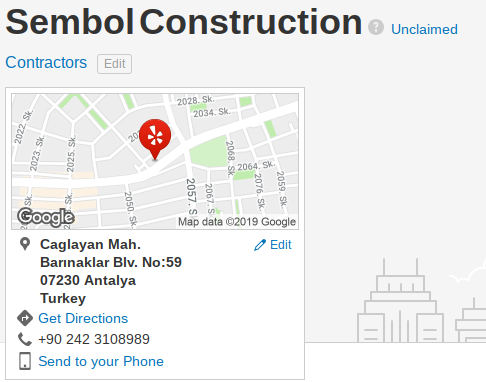
So, in early Jan 2015, the US propaganda arm out of Prague, good ole Radio Free Europe Lady Liberty, wrote an article titled Ghosts of Sochi: Hundreds Killed in Olympic Construction link which stated regarding Sembol Construction:
I'll continue with Potok (formerly the Mirax Group), and TxOil next.
Rixos Hotels and Resorts
Quick lowdown: Rixos Hotels website
- Hotels in Turkey, United Arab Emirates, Egypt, Croatia, Switzerland, Russia, and Kazakhstan
- Properties in Azerbaijan, Egypt, Kazakhstan, Russia, Switzerland, Turkey, and the UAE.
- Founded by Fettah Tamince in Antalya, Turkey (2000)
- Beginning in 1999, Tamince had a partnership with Tevfik Arif in the Antalya-based Labada Hotel
- Some of Rixos Hotels' projects product of unofficial joint ventures with Russian investors and "in the mid-2000s Russian American businessman Felix Sater was appointed senior advisor to the company."
- Rixos relocated its headquarters to Dubai in 2014
- Bugra Berberoglu is the company's CEO
- Seven of the Rixos Hotels' waterfront resorts were developed by the Bayrock Group.
- As of 2016, Rixos Hotels was the largest hotel chain in the East Mediterranean Europe region, with plans to add 13 hotels by end of 2020.
Sembol Construction
According to this site, Archello, link, Sembol Construction is contractors in Istanbul, Turkey, and involved in Kazakhstan projects.
This YouTube video uploaded by Sembol Construction is from Astana Expo, Kazakhstan [Jan 8, 2015]
The only other video they have ever uploaded is some employee happy smiling faces and laughing compilation to the song Happy, by Pharrell. Sembel Construction YouTube Channel
Yelp, unclaimed for Sembol Construction Antalya

So, in early Jan 2015, the US propaganda arm out of Prague, good ole Radio Free Europe Lady Liberty, wrote an article titled Ghosts of Sochi: Hundreds Killed in Olympic Construction link which stated regarding Sembol Construction:
Turkish architect Destan Kilic arrived in Sochi in at the beginning of 2013, employed first by the Russian construction firm TransKomStroi and then a Turkish company, Monolith. These companies worked closely with Istanbul-based Sembol, building leisure facilities in Krasnodar Polyana, an 800,000-square-meter site in the hills overlooking the city. Kilic left in February 2014, after arguments with bosses over the treatment of migrant workers. Kilic says that the project relied on high numbers of illegals and deaths were in the hundreds during her time there. "There were a lot of Uzbeks among the dead and unregistered workers," she says. "I would always hear: 'this worker died today on this site'...'somebody fell again'.... 'Something collapsed on a worker.'"
Nothing was ever recorded, because they were unregistered.
She tells of one incident where a worker, without proper equipment, scaling a tall height fell to his death. When the construction company found his body, the staff attached a safety belt to the corpse and then took pictures. They did this, she says, so that they could blame the worker for his own demise.
"Health and safety measures were nonexistent," she says. "There were no safety personnel, as required. In Sochi, companies would just register an engineer as the safety person."
Kilic complained to her bosses. But the disregard for worker welfare came straight from the top. During one dispute, priorities were made clear when she was passed a diktat from Aytekin Gultekin, boss of Sembol Construction. "I was told by management: 'This is war. Everything is permitted,'" Kilic says. "'Those who will die, will die. And those who will be deported will be deported. What is important is completing the job.'"
Kilic also says this brutality extended to Uzbek women in Sochi, hired as cleaners, servers, and kitchen staff. She says sexual assault by management was widespread. "The men forced the women to sleep with them," she adds. "The whole atmosphere was disgusting."
A manager at Sembol, who asked to remain anonymous, confirmed to Theblacksea.eu that the rape and sexual assault of Uzbek women was frequent and conducted with impunity. "It was extremely, extremely common," he says. "Most cases do not go to court because Uzbek women are uneducated villagers working illegally. Management always turns a blind eye."
I'll continue with Potok (formerly the Mirax Group), and TxOil next.
I think one of the most important things to keep in the back of your mind here is Felix Sater (aka Satter, Slater) was doing the bidding of a
Clinton-Bush-Obama FBI, CIA, DIA, etc. from 1998-2017. It's only after 2017, he was doing the bidding of these agencies in the midst of transition to
Trump.
Potok, formerly the Mirax Group
Wikipedia
Sergei Polonksy founded the Mirax Group, but on March 4 2011, announced at a media press conference the brand would no longer be used but all outstanding projects completed and debts honored. Then on Dec 1, 2011, with inherent structures and liabilities from Lazanie.net (former Mirax Group), the name was changed to Potok.
Where Lazanie.net comes from is unclear. But what comes next seems important and connected to this need for a stop/brand change/name change:
While not a lot of this makes sense to me, what does stand out is one and a half years back from July 2012 is around March 2011 press conference... then fast forward to Dec 2011 it becomes Potok and by July of the following year, it is restructured with Alfa Bank in the picture.
What also stood out to me as strange is while Felix was allegedly trying to work this Trump Tower Moscow deal, it would be interesting to know when he was an advisor for Potok, or rather Sergei Polonsky, given this information:
Source
Sergei Polonski
Based off his Wiki page, he's the owner and head of the largest real estate company in Russia, which was Mirax Group (2004-2011), but currently awaiting trial in Moscow on charges of fraud. On July 12, 2007, after being found guilty the judge had ruled too much time had passed since his original crimes for the court's decision to be implemented as his sentence. He was born in Leningrad, which is now Saint Petersburg, Russia, and joined the Airborne Troops in 1989, completing his service "stationed in the time of the armed conflict between South Ossetia and Georgia in the combat zone at Tskhinval."
But by 2017, the head of Potok, formerly Mirax Group, is being convicted guilty of fraud in years past. This tower has been an ongoing project from 2005 to stalling in 2008, to resuming in 2011 and finally completing in December of 2017.
Running out of space. To be continued.
Potok, formerly the Mirax Group
Wikipedia
Potok is a Russian investment and development company with the head-office in Moscow. Its activities include mixed-use development, construction, managing and selling of real estate in Moscow and abroad. The projects, which were previously under the control of the Mirax Group corporation, now are being developed by this brand.
Sergei Polonksy founded the Mirax Group, but on March 4 2011, announced at a media press conference the brand would no longer be used but all outstanding projects completed and debts honored. Then on Dec 1, 2011, with inherent structures and liabilities from Lazanie.net (former Mirax Group), the name was changed to Potok.
Where Lazanie.net comes from is unclear. But what comes next seems important and connected to this need for a stop/brand change/name change:
In July 2012, the restructuring of the public debt of the Potok company (ex-MIRAX GROUP) was successfully completed. It took the company one and a half years to prepare this deal together with the debt restructuring agent, OAO Alfa-Bank and a working group of creditors. The restructuring included the exchange of the five existing at the time security issues – three ruble bond issues and two English law note issues – for the new issue of notes (LPN2019) with the face value of RUR14.5 billion. As collateral for this transaction, 8 projects and a personal guarantee of the Potok shareholder Sergei Polonsky were used. For investors who can not own the notes for certain reasons, new ruble bonds worth RUR1 billion were issued.
While not a lot of this makes sense to me, what does stand out is one and a half years back from July 2012 is around March 2011 press conference... then fast forward to Dec 2011 it becomes Potok and by July of the following year, it is restructured with Alfa Bank in the picture.
What also stood out to me as strange is while Felix was allegedly trying to work this Trump Tower Moscow deal, it would be interesting to know when he was an advisor for Potok, or rather Sergei Polonsky, given this information:
Because this guy Sergei from Potok, or Mirax Group, had already been building the tallest building in Moscow in the middle of 2011 after he's just announced in March the Mirax Group brand is gone.
Potok operates in the real estate markets of Russia, Ukraine, France, Cambodia, Malaysia, Montenegro, United States, Switzerland and Beetham Tower in United Kingdom. In May 2011, the company's portfolio included several projects with a total area of about ten million sq.m. Potok is the client and developer of the future tallest building in Eastern Europe, business complex Federation Tower, which is currently under construction in the Moscow International Business Center – "Moskva City". In May 2011, Sberbank of Russia allowed a credit of $373.6 mln for the completion of the tower construction.
Source
Sergei Polonski
Based off his Wiki page, he's the owner and head of the largest real estate company in Russia, which was Mirax Group (2004-2011), but currently awaiting trial in Moscow on charges of fraud. On July 12, 2007, after being found guilty the judge had ruled too much time had passed since his original crimes for the court's decision to be implemented as his sentence. He was born in Leningrad, which is now Saint Petersburg, Russia, and joined the Airborne Troops in 1989, completing his service "stationed in the time of the armed conflict between South Ossetia and Georgia in the combat zone at Tskhinval."
Polonsky opened an office in Moscow in 2000, after graduating from St. Petersburg State University of Architecture and Civil Engineering. Two years later, Mayor Luzkhov appointed him as an adviser. Polonsky was not yet 30.
Mirax Group In 2004, the Moscow branch of Stroymontazh was renamed "Mirax Group" and in 2006, split from Stroymontazh, the St Petersburg branch, with Polonsky at the head of Mirax and Kirilenko at the head of Stroymontazh. Both men maintained 10% ownership of the other's company until 2009 when they each sold their respective stakes. Mirax carried out projects in Russia, Ukraine, Turkey, Cambodia and the United States. At its peak in the late 2000s, Mirax Group's assets amounted to more than 12 million square meters of real estate, with 2008 revenues estimated at $1.65 billion and net profits of $616.4 million.[6][7] Some notable projects are outlined below. Moscow's Federation Tower Federation Tower Identified as Moscow's first skyscraper, the Federation Tower when completed will be the tallest building in Europe. The building consists of two towers, the taller one with 93 floors and a height of 1,161 feet, and the other with 63 floors. A 1,470-foot spire will rise between the two, with glass elevators running up its core, offering a panoramic view and entry into the buildings. The towers will have 4.5 million square feet of high-end office space, luxury apartments, shops, restaurants, and a 44-story Grand Hyatt hotel.[4] In 2009, The Federation Tower won the FIABCI World Prix d’Excellence Award (Office Category Winner).[8] Construction of the project stalled in 2008 as a result of the financial crisis, however, it was resumed in August 2011 and was set to be completed in 2015.[9]
But by 2017, the head of Potok, formerly Mirax Group, is being convicted guilty of fraud in years past. This tower has been an ongoing project from 2005 to stalling in 2008, to resuming in 2011 and finally completing in December of 2017.
Running out of space. To be continued.
Federation Tower
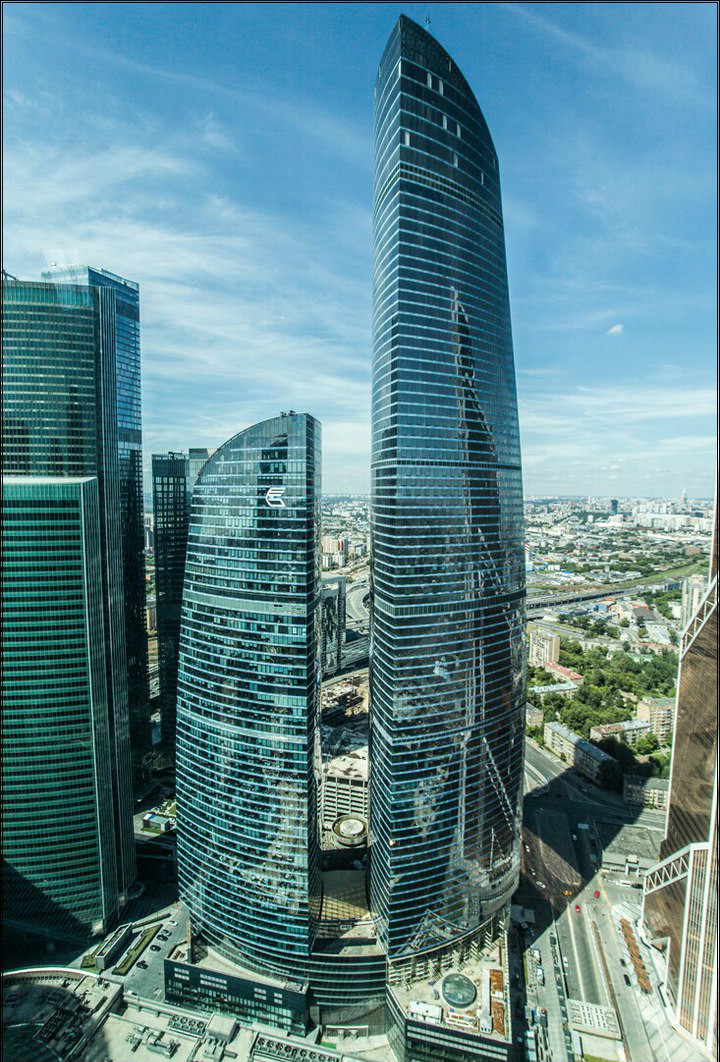
Apparently, what may have made the building even taller was an idea taken off the table throughout the process and issues with funding.
Emphasis mine
AEON Corporation Link
AEON Finance Partners: Sberbank, Meridian Capital, and

AEON Construction Partners: Stolitsa Development, Renaissance Construction, and

There is one AEON Consulting Partner listed:
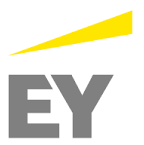
Meridian Capital Group, LLC

Source
So after going through all these researching Sater, finding it interesting he would be an "advisor" for these companies, it was pretty surprising to get to TxOil and realize it's a Bush deal.
TxOil
Source
Why I find it particularly interesting Sater being an "advisor" to TxOil, which Neil Bush heads, is the fact Neil's ties to foreign interests would have made him an intelligence target. Regardless of who he was.
Excerpts from a 2011 article to provide details
The Atlantic
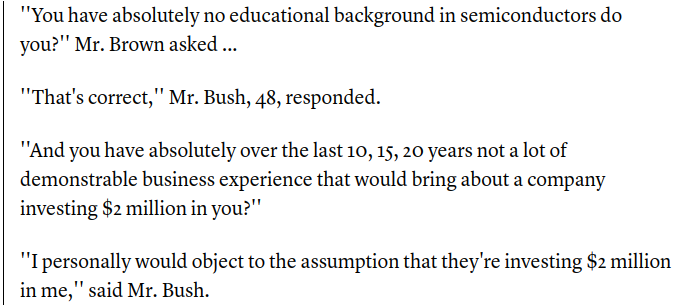
This is NPR Aug 2012 Link

Apparently, what may have made the building even taller was an idea taken off the table throughout the process and issues with funding.
The supertall skyscraper Tower East (Vostok) is currently the second tallest skyscraper in Europe and Russia after Lakhta Center, and the 46th-tallest building in the world. Zapad is a shorter skyscraper than Vostok and is the 11th-tallest building in Russia. The complex stands on the 13th lot, which has an area of 439,154 square meters. The project was conceived by German-Russian engineer Sergei Tchoban and German professor and engineer Peter Schweger. The complex was designed by architecture companies nps+partner and Schweger Associated Architects. The complex started construction in 2005, with Zapad completed first in 2008 with a height of 242 meters (794 feet). As a result of the Great Recession, construction of the complex stopped until August 2011, and Vostok was completed in December 7, 2017 with a height of 373,7 meters (1,226 feet). In late 2014, Vostok surpassed the South Tower of OKO, which it is also part of the MIBC, as the tallest skyscraper of Russia and Europe. A spire was to be also built which would have extended the complex's height to 450 meters (1,476 feet) as well as provided an observation deck but it was never completed and was dismantled afterward. The complex is owned by the AEON Corporation, a Russian private international investment group. The complex consists of two towers built on one podium. Tower East is a 97-story structure and Tower West is a 63-story structure.
Emphasis mine
AEON Corporation Link
AEON Finance Partners: Sberbank, Meridian Capital, and

AEON Construction Partners: Stolitsa Development, Renaissance Construction, and

There is one AEON Consulting Partner listed:

Meridian Capital Group, LLC

Meridian Capital Group is a Manhattan-based commercial real estate finance firm founded in 1991 by Ralph Herzka and Aaron Birnbaum. In 2015, Meridian Capital Group did $35 billion in national business, more than two-thirds of it in the Northeast region. It is the second-largest mortgage broker in the United States. In New York, Meridian specializes in multifamily loans. Its rivals include Ackman-Ziff, Cooper-Horowitz, Holliday Fenoglio Fowler, and Singer & Bassuk. Meridian helps real estate investors find sources of financing, ranging from traditional banks to pension funds, hedge funds, insurance firms or wealthy individuals, and is paid a fee for its service. Meridian Capital Group was ranked no. 7 in The Real Deal’s annual investment sales ranking covering 2016.
Source
Sberbank is a state-owned Russian banking and financial services company headquartered in Moscow. The company was known as "Sberbank of Russia" until 2015. Sberbank has operations in several European and post-Soviet countries. As of 2014 it was the largest bank in Russia and Eastern Europe, and the third largest in Europe, ranked 33rd in the world and first in central and Eastern Europe in The Banker's Top 1000 World Banks ranking.
So after going through all these researching Sater, finding it interesting he would be an "advisor" for these companies, it was pretty surprising to get to TxOil and realize it's a Bush deal.
TxOil
Source
Current Scope of Operations TX Oil Ltd., which is led by Neil Bush, son of President George H. W. Bush, was established in 2010 for the exclusive purpose of pursuing energy contracts with Turkmenistan. In August 2010, it was one of four companies shortlisted by the government of Turkmenistan to submit a proposal for developing offshore Blocks 9 and 20. Bush traveled twice to Turkmenistan in 2010 and met with Berdymukhammedov.
Why I find it particularly interesting Sater being an "advisor" to TxOil, which Neil Bush heads, is the fact Neil's ties to foreign interests would have made him an intelligence target. Regardless of who he was.
Excerpts from a 2011 article to provide details
The Atlantic
In 2009, Dow Jones reported that Neil was running a Beijing-based real estate company, working with steel maker Shougang Holdings to break into Africa, and representing Chinese oil giant Sinopec Group in its ultimately unsuccessful bid for part of an oil field in Ghana. Neil's business deals in China came under greater scrutiny six years earlier during his messy divorce from Sharon Bush. In one court exchange, Marshall Davis Brown, a lawyer for Ms. Bush, questioned Neil about a $2 million contract he had with China's Grace Semiconductor Manufacturing Corporation to provide the company "from time to time with business strategies and policies; latest information and trends of the related industry, and other expertised advices." In the court transcript, the lawyer implied that the arrangement may have been more about influence peddling than consulting services (Neil was never found to have done anything improper):

Neil, who pointed out that he did have business experience in Asia, explained that he joined Grace's board at the suggestion of Taiwanese businessman Winston Wong, who had previously invested in Neil's educational software start-up, Ignite! When Neil traveled around the world to raise money for the venture, he dismissed the notion that a private dinner with former Chinese President Jiang Zemin and other political leaders had anything to do with the effort. "If I had any meetings with top-level China officials, the word Ignite never came into any conversation," he told the AP.
This is NPR Aug 2012 Link
China's latest online sensation is a Bush, but perhaps surprisingly, it's neither the 41st or the 43rd President of the US. In fact, Neil Bush, the younger brother of 43 and the son of 41 has become an online sensation in China after posting a joke photo on China's version of twitter. Neil Bush was virtually unknown in China a week ago, despite being co-chairman of Beijing-based real estate company, CIIC.
He opened an account on China's vibrant micro-blogging platform, Weibo, back in August 2011 by introducing himself in Chinese, as "the unpolitical member of a very political American family."
Now his microblog has become a hot political topic inside China, after he posted a photo of himself wearing a Communist-style green cap with a red star. Slung across his chest is a bag emblazoned with Chairman Mao's slogan "Serve the People", and he's holding a mug featuring Chairman Mao.
The caption — accompanied by a chuckling face icon — reads, "I'm thinking of joining the Chinese Communist party. What do you think of my accessories?" This picture has been forwarded almost ten thousand times, with more than five thousand comments posted, mostly sarcastic, which is not atypical on China's microblogs. Most of the comments have not been censored or deleted.
Will add more this week.
But these additional details add more background to an already interesting character.
These companies and associated people Sater was an advisor for, all while working as an asset for the FBI, CIA, DIA, and for many years working right out of Trump Tower doing licensing real estate deals with the now President of the United States.
As of late 2007, cozying up with Ablyazov who is allegedly defrauding BTA Bank by billions.
Busy guy.
But these additional details add more background to an already interesting character.
These companies and associated people Sater was an advisor for, all while working as an asset for the FBI, CIA, DIA, and for many years working right out of Trump Tower doing licensing real estate deals with the now President of the United States.
As of late 2007, cozying up with Ablyazov who is allegedly defrauding BTA Bank by billions.
Busy guy.
I'm back (yet I don't think a single soul is currently tracking this thread). LOL
Life has been keeping me busy. Any moms out there happening to read this, I hope you had a great Mother's Day!
At this point, I want to derail the thread into a slight detour on Muhktar Ablyazov because recent events have transpired which are relevant to the big picture of all this.
Interestingly, Ablyazov links to Open Dialog Foundation, an NGO, which links to of course, George Soros.
Muhktar Ablyazov is again the dude who allegedly sold the Uranium One assets in earlier posts. Defrauded BTA Bank allegedly of billions of dollars, had organized an anti-Nazarbayev political party (Kazakhstan President) in the early 2000s before it was shut down and he became the Chairman of BTA Bank from 2005-2009 before fleeing to Russia and then to Europe as charges were coming down against him and the Khrapunovs.
Ablyazov has continued to proclaim his innocence and recently worked to organize Kazakhstan protests on May 9th, this past Thursday.
'Kazakh Protestors Detained As Websites Go Dark'
Emphasis mine.
Further down, more context
'Police Detain Dozens Demanding Release of Political Prisoners in Kazakhstan'
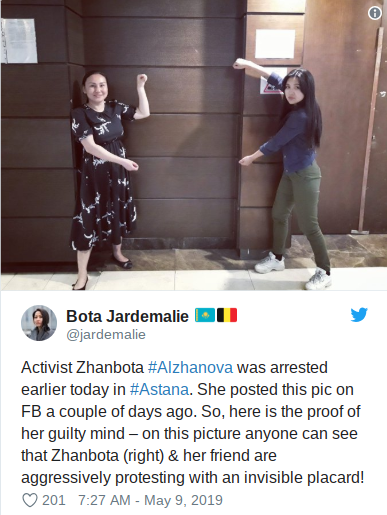
Source
More to come in follow-up post
Life has been keeping me busy. Any moms out there happening to read this, I hope you had a great Mother's Day!
At this point, I want to derail the thread into a slight detour on Muhktar Ablyazov because recent events have transpired which are relevant to the big picture of all this.
Interestingly, Ablyazov links to Open Dialog Foundation, an NGO, which links to of course, George Soros.
Muhktar Ablyazov is again the dude who allegedly sold the Uranium One assets in earlier posts. Defrauded BTA Bank allegedly of billions of dollars, had organized an anti-Nazarbayev political party (Kazakhstan President) in the early 2000s before it was shut down and he became the Chairman of BTA Bank from 2005-2009 before fleeing to Russia and then to Europe as charges were coming down against him and the Khrapunovs.
Ablyazov has continued to proclaim his innocence and recently worked to organize Kazakhstan protests on May 9th, this past Thursday.
'Kazakh Protestors Detained As Websites Go Dark'
NUR-SULTAN -- Police in Kazakhstan have detained several anti-government protesters who staged demonstrations during ceremonies to mark the 74th anniversary of the Allied victory against Nazi Germany in World War II. RFE/RL correspondents witnessed the detention of at least one protester in Nur-Sultan, the capital, and several in Kazakhstan's largest city, Almaty.
Meanwhile, many social-media apps and news websites were inaccessible in Kazakhstan for most of the day on May 9 -- including the website of RFE/RL's Kazakh Service. The developments came a day after the Prosecutor-General's Office called on citizens not to organize or participate in unsanctioned rallies on Victory Day -- warning of 'harsh" punishment for such activities.
Earlier, fugitive former banker Mukhtar Ablyazov, a vocal critic of the Kazakh government who lives in France, called on Kazakhs via the Internet to hold protest demonstrations during the Victory Day celebrations.
Emphasis mine.
Further down, more context
Several protests have been held across the country recently, an indication of growing discontent with the political system that has been dominated by 78-year-old former President Nursultan Nazarbaev since before the 1991 Soviet collapse. Nazarbaev retains the title of Leader of the Nation, despite stepping down as president in March. Many of the protests have been focused on the upcoming June 9 snap presidential election, which was scheduled following Nazarbaev's surprise resignation. Opponents, critics, and rights groups say Nazarbaev, who tolerated little dissent, denied many basic rights and prolonged his power in the energy-rich country of 18.7 million by undermining democratic processes. No vote held in the Central Asian country since 1991 has been deemed free and democratic by international observers. Nazarbaev's resignation caught many observers off guard. However, the fact that he continues to lead the ruling party and will also keep his lifetime post as chairman of the influential Security Council, has led many experts to conclude that the resignation was a legal sleight of hand aimed at extending his rule over the country.
'Police Detain Dozens Demanding Release of Political Prisoners in Kazakhstan'
On May 9, human rights defenders in Kazakhstan told RFE/RL that about a dozen activists were summoned by police regarding their plans to organize the rallies that were spearheaded by the banned Democratic Choice of Kazakhstan (DVK) movement. The DVK was established by Mukhtar Ablyazov, a fugitive critic of President Nursultan Nazarbaev. Ablyazov told RFE/RL on May 10 that the protests in Astana, Almaty, and several other cities in Kazakhstan, had been organized by him via the Internet. In March, a court in Astana banned the movement, branding it an extremist organization.

Source
More to come in follow-up post
Turned off the italics - sorry.
When seeking out recent news regarding the protests Ablyazov was trying to inspire within Kazakhstan from his exile in France, I happened to glean out an article regarding new allegations tied to money laundering Open Dialog Foundation tied to Ablyazov, from the Sunday TImes in the UK.
'An Edinburgh flat, a human rights activist and the oligarch's dirty money'
This is from last month [4.21.19] and is a paywall so I did the 30-day free trial to read in full.
Among claims highlighted by The Sunday Times today is that Scottish companies were used to launder cash through a non-governmental organisation run by Kozlovska, to fund a secret lobbying campaign on behalf of two criminal eastern European oligarchs. Veaceslav Platon, a Moldovan businessman, was jailed in 2017 for money-laundering and fraud linked to the disappearance of $1bn (£770m) from Moldova’s banking system a few years earlier. The missing money caused a political crisis in Moldova, one of Europe’s poorest countries, which is squeezed between Ukraine and EU member state Romania. There are claims that Platon has funded Kozlovska, a former student at the University of Wales in Bangor, and Warsaw’s Open Dialogue Foundation (ODF), which claims to promote human rights and the rule of law in Russia and its former Soviet satellite republics.
Apparently Kolovska is Lyudmyla Kozlovska, President of Open Dialog Foundation, who has not been allowed to travel back to the EU since last year, when her passport was examined and she was not allowed entrance at airport in Brussels.
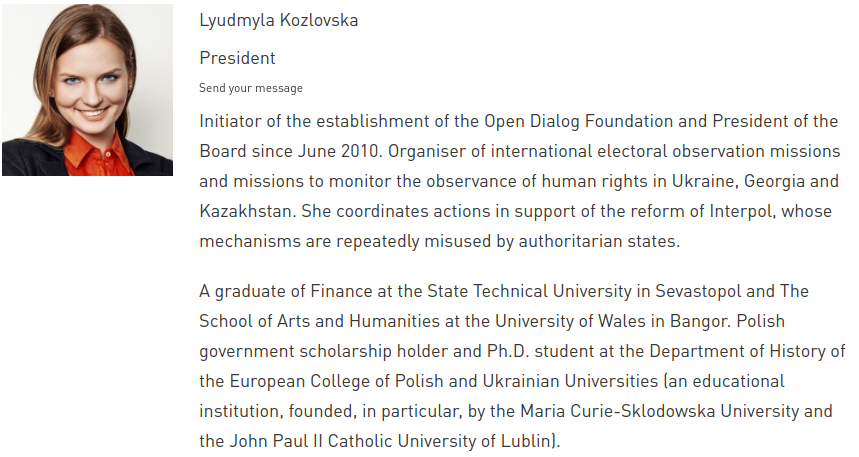
Source
The article in the UK Times goes on to state:
The Moldovan parliament suggests that another important source of funding for the foundation is Kazakh oligarch Mukhtar Ablyazov, the subject of the biggest fraud case ever heard in the British High Court. Ablyazov went on the run in 2012 after being accused of stealing up to £4bn from the BTA Bank, of which he was chairman. Backed by Royal Bank of Scotland, BTA had to be bailed out by Kazakh taxpayers after its collapse in 2008.
The most important part of the article I'm going to attempt to summarize because I'm a little leery of copy pasta of paywall accounts and violating their terms and conditions. I don't want to copy too much of it even though it's all interesting.
There was a commission of inquiry by the Parliament of Moldova which was published Nov of last year, which concluded both Kozlovska and her Foundation were involved in activities against their country, "funded and orchestrated by special services that are hostile to that state." The report alleges she and the Open Dialog Foundation had been funded from "transactions with Russian military companies banned from trading in America and the EU under international sanctions, as well as from the supply of military equipment to states involved in regional conflicts." The report also stated the payments came from offshore areas of dubious unknown origins and from "Laundromat" money-laundering schemes.
The report added (I feel comfortable quoting the report being quoted in the article):
"The sophisticated mechanism through which the ODF is funded bears all the hallmarks of a money-laundering scheme and indicates practices involving financial intelligence which only the special services employ.
“In reality, the ODF and Lyudmyla Kozlovska are a vehicle for lobbying and influencing various international institutions and for protecting and furthering the interests of certain persons with a dubious past, usually with considerable wealth originating from fraud and money laundering, contrary to the law.”
Alrighty then.
The report accuses the ODF and Kozlovska of having “relationships with and obligations towards agents of the intelligence services of the Russian Federation and are dependent on them . . . making them a tool for soft power intervention which is used by the special services of the Russian Federation in the hybrid war that has begun to be waged against states regarded by it as enemies of the geopolitical interests of the Russian Federation in Eastern Europe.”
There are supporters of the ODF who counter Moldova is ruled by oligarch Vladimir Plahotniuc, who effectively controls the country with little separation of powers. The European Parliament last year had declared Moldova "a state captured by oligarchic interests."
The question remains if this fresh-faced activist Kozlovska is a "blameless pawn" or an "active combatant in a hybrid war being waged between Russia and the West"?
I'll continue in another follow-up post.
The Moldovan parliament report goes on to claim payments for fictional accounts were paid through companies in Scotland to finance activities for ODF,
who they say then lobbied for the interests of Veaceslav Platon.... in exchange for him funding them through offshore companies which had been
previously linked to the Russian Laundromat and Moldovan banking scandals.
It turns out in 2017, this Platon guy was convicted of embezzling $42m in a banking fraud scandal in Moldova known as the "theft of the century" when 1/8 of the country's GDP was stolen from the three largest banks during 2012-14. Platon was also suspected of being involved in a money-laundering operation which funneled about 22 billion of Russian money through Moldova's financial system between 2011-14 as part of the Russian Laundromat, which he of course denies any wrongdoing.
These payments which were made to the ODF allegedly came through a complex web of offshore entities which were registered to Scotland limited partnerships which under obscure law are permitted to operate without paying any taxes, publishing any accounts or declaring publicly who even owns them.
One of these companies is called Kariastra Project and was registered Feb 2013 in a virtual office on Bath Street in Glasgow. With its principal place of business listed as a 78 Montgomery Street in Edinburgh, of course home to a "prolific number of" Scottish tax haven law firms. "There is no suggestion that anyone at either address knew about the activities of the company."
Listed in registration documents as offshore partners are Lausanne Group SA and Sion Holding SA, who are both owners of Avenilla Commercial, which is named in a report by US investigators into Moldova corruption.
Gosh, it's kinda wild Seychelles is where Mr. Erik Prince met with Mohammed bin Zayed, who had suggested Prince meet with Russian Kirill Dmitriev nine days before Trump was sworn in, which had been a topic of the mainstream media and an alleged point of concern for Mueller's team of investigators. But I digress...
So basically this Silk Road was described as a "trader in cork" but had no website, no phone number, or any public evidence of its commercial activity before "being struck off in 2017."
Bear with me. This gives you context before the article gets to Ablyazov and how he connects to Kozlovska.
So after Platon was arrested, the following things took place by ODF:
- Allegedly paid for his family members and entourage to fly from Bucharest to Warsaw
- Moldovan investigators obtained the airline tickets which were booked by Rafal Matouszek, who is ODF's Logistics Coordinator, on behalf of Platon's lawyer Ana Ursachi
- Four days after his arrest, ODF purchased airline tickets for Platon's sons, Atriom and Egor, to fly from Odessa to St Petersburg, and the following week apparently paid for a ticket for Ursachi's father, Constantin, to fly from Odessa to St Petersburg, which took place after the apartment her father and son were staying in had been raided by Moldovan authorities, during which Ursachi's computer and tablets were seized during their search
There are also obtained documents which suggest ODF paid for Platon's solicitors Eduard Rudenco and Alexei Tulbure, to fly from Chisinau in Moldova to Frankfurt. In the month following, Kozlovska "launched a campaign to lobby the EU to restrict financial assistance to Moldova."
Their Director of Public Affairs, Martin Mycielski, dismissed all of the report's allegations which he stated was "hastily produced within weeks without proper investigation by a special parliamentary committee, created at the request of the head of Moldova's ruling PDM party before parliamentary elections to discredit the pro-EU opposition ACUM bloc."
More to come.
It turns out in 2017, this Platon guy was convicted of embezzling $42m in a banking fraud scandal in Moldova known as the "theft of the century" when 1/8 of the country's GDP was stolen from the three largest banks during 2012-14. Platon was also suspected of being involved in a money-laundering operation which funneled about 22 billion of Russian money through Moldova's financial system between 2011-14 as part of the Russian Laundromat, which he of course denies any wrongdoing.
These payments which were made to the ODF allegedly came through a complex web of offshore entities which were registered to Scotland limited partnerships which under obscure law are permitted to operate without paying any taxes, publishing any accounts or declaring publicly who even owns them.
One of these companies is called Kariastra Project and was registered Feb 2013 in a virtual office on Bath Street in Glasgow. With its principal place of business listed as a 78 Montgomery Street in Edinburgh, of course home to a "prolific number of" Scottish tax haven law firms. "There is no suggestion that anyone at either address knew about the activities of the company."
Listed in registration documents as offshore partners are Lausanne Group SA and Sion Holding SA, who are both owners of Avenilla Commercial, which is named in a report by US investigators into Moldova corruption.
The Moldovan parliament report said: “There are reasonable suspicions that Kariastra Project was involved in money-laundering activities. Through the account held at AS PrivatBank (Latvia) by Kariastra Project, banking transactions worth a total of €5,228,024 and $27,764,388 took place with different companies registered in offshore regions, based on fictitious contracts for the sale and purchase of goods and machinery.”
According to the report, Kariastra Project paid Kramek’s company, Silk Road Bureau of Analysis and Information, which shares the same office as the ODF, a total of £720,378 (made up of $852,828 and €64,785) for computer and IT services in 2014 and 2015.
Silk Road is said to have been paid a further £348,203 ($448,465) by Stoppard Consulting in Edinburgh, for “consulting services” between 2014 and 2016.
The company, registered at a virtual office at Duke Street, Edinburgh, was incorporated in 2010 via offshore companies based in the Seychelles. It is affiliated to companies owned by Platon, including Harwood United, Harrogate Consulting, Rosslyn Trade, Winston Associates (Seychelles), Carberry Investment (Seychelles), Erin Group Corp (Belize) and Maytree Overseas SA (Panama), which was involved in the Panama Papers.
Gosh, it's kinda wild Seychelles is where Mr. Erik Prince met with Mohammed bin Zayed, who had suggested Prince meet with Russian Kirill Dmitriev nine days before Trump was sworn in, which had been a topic of the mainstream media and an alleged point of concern for Mueller's team of investigators. But I digress...
So basically this Silk Road was described as a "trader in cork" but had no website, no phone number, or any public evidence of its commercial activity before "being struck off in 2017."
The report said: “The organisation Silk Road Biuro Analiz i Informacji is the recipient of multiple suspicious transfers originating from companies which are among the main recipients of funds stolen from financial institutions in the Republic of Moldova. Between 2014 and 2017, B Kramek, the husband of Lyudmyla Kozlovska, received transfers to the value of $1.2m and €60,000 from an offshore company registered in Scotland, Stoppard, through Silk Road Biuro Analiz i Informacji.” It added: “The basic sources of the ODF’s funding, which have not been declared publicly and transparently, were channelled temporarily through the bank accounts of the Silk Road Biuro Analiz i Informacji organisation.”
Bear with me. This gives you context before the article gets to Ablyazov and how he connects to Kozlovska.
So after Platon was arrested, the following things took place by ODF:
- Allegedly paid for his family members and entourage to fly from Bucharest to Warsaw
- Moldovan investigators obtained the airline tickets which were booked by Rafal Matouszek, who is ODF's Logistics Coordinator, on behalf of Platon's lawyer Ana Ursachi
- Four days after his arrest, ODF purchased airline tickets for Platon's sons, Atriom and Egor, to fly from Odessa to St Petersburg, and the following week apparently paid for a ticket for Ursachi's father, Constantin, to fly from Odessa to St Petersburg, which took place after the apartment her father and son were staying in had been raided by Moldovan authorities, during which Ursachi's computer and tablets were seized during their search
There are also obtained documents which suggest ODF paid for Platon's solicitors Eduard Rudenco and Alexei Tulbure, to fly from Chisinau in Moldova to Frankfurt. In the month following, Kozlovska "launched a campaign to lobby the EU to restrict financial assistance to Moldova."
The Moldovan parliament report said: “The ODF made Veaceslav Platon a central focus of its activities in an attempt to portray him as a victim and gain support from the international community on the pretext of ‘persecution’ of a political opponent of the government who was taking refuge in Ukraine.”
According to the report, Ukranian-born Kozlovska met Ablyazov in Kiev in their student days and during the Orange revolution of 2004. He disappeared in 2012, after being convicted by London’s High Court of contempt of court. In 2016, a string of luxury London properties owned by him, worth £11m, were auctioned after being seized through the High Court.
The report said: “The ODF positioned itself from the outset as an advocate for the oligarch and spared no time, money or effort in lobbying, in the public domain and also before European institutions, in order to peddle the myth that Ablyazov is not a criminal, fraudster and thief who has stolen billions, but a dissident persecuted by the leaderships of Ukraine, Kazakhstan and Russia, which have issued international warrants for his arrest.”
Their Director of Public Affairs, Martin Mycielski, dismissed all of the report's allegations which he stated was "hastily produced within weeks without proper investigation by a special parliamentary committee, created at the request of the head of Moldova's ruling PDM party before parliamentary elections to discredit the pro-EU opposition ACUM bloc."
More to come.
This is again continued from the Times article in the UK regarding Kozlovska's ties to Ablyazov.
The article goes on to state a John Hein, who resides at 78 Montgomery Street, said he knew nothing of Kariastra Project's activities. He previously ran a company formation agency which he closed in 2016, "following a series of visits by police investigating alleged illegal activities by some limited partnerships."
He states in the article:
The article concludes by stating the political clamour to fix these tax loopholes is "continuing."
So, what does all this mean? Well, before we do a recap of how this all circles around Sater's alleged ties to Ablyazov post-2007, let's outline how ODF connects to George Soros.
But instead of linking to a few articles first which link Soros to ODF, the ODF statement regarding all this is more interesting. Let's start with it.
[url=https://en.odfoundation.eu/a/8294,the-open-dialog-foundation-s-statement-of-31-july-2017-funding-and-donors-or-a-few-words-about-soroses]Source[/ url]
Let's start with their Point #3.
I think one can realistically conclude here that Vladimir Putin would not be fans of ODF, George Soros, or therefore, Ablyazov. Which may account for the reports Ablyazov first fled to Russia, then on to Europe, France to be exact.
To Be Continued...
The organisation, Mycielski said, represented Platon as part of its advocacy work for a period of three to four months.
“Independently of his biography or any crimes he might have committed, his case warranted concern, as he had been extradited from Ukraine with disregard for the rule of law or due process, having unlawfully stripped of his Ukrainian citizenship and being deported overnight to Moldova.”
Mycielski added: “It’s very likely that ODF paid for flights for Platon’s family during the period that we advocated for his case, just as we do regularly for family members of other victims of political persecution, when we invite them to speak at our events or help us raise awareness of human rights violations.”
Regarding the Scottish companies named in the report, Mycielski said: “For obvious confidentiality reasons, the company [Silk Road] does not comment on past or current clients. Having said that, ODF has never received any funds from any Scotland-based company.
“ODF is an international NGO with over 10 years of documented history in human rights and rule of law defence in numerous countries [in Moldova, since only 2016]. It does not, and never did, ‘launder cash’ nor provide ‘secret lobbying campaigns’.
“Our body of work speaks for itself. The advocacy work we do is never directed by anyone’s interest or paid for by anyone. The only motivation for our work are the principles or respect for human rights, rule of law and democracy, or the generally understood European values.”
The article goes on to state a John Hein, who resides at 78 Montgomery Street, said he knew nothing of Kariastra Project's activities. He previously ran a company formation agency which he closed in 2016, "following a series of visits by police investigating alleged illegal activities by some limited partnerships."
He states in the article:
“Unfortunately for us, while the bulk of limited partnerships relocated their registered offices to other addresses, a number failed to do so and have, in effect, been abandoned at our address. Kariastra Project . . . did actually change its registered office in 2015,” he said.
The article concludes by stating the political clamour to fix these tax loopholes is "continuing."
So, what does all this mean? Well, before we do a recap of how this all circles around Sater's alleged ties to Ablyazov post-2007, let's outline how ODF connects to George Soros.
But instead of linking to a few articles first which link Soros to ODF, the ODF statement regarding all this is more interesting. Let's start with it.
[url=https://en.odfoundation.eu/a/8294,the-open-dialog-foundation-s-statement-of-31-july-2017-funding-and-donors-or-a-few-words-about-soroses]Source[/ url]
Let's start with their Point #3.
3. We must also mention that in connection with our activity (and the interest that it evokes), over seven years we have been subjected to various types of inspections (by fiscal services, Social Insurance Institution [ZUS] or the National Labour Inspectorate [Państwowa Inspekcja Pracy]). We have made available all the documents, provided explanations and fulfilled our obligations. Our activity, due to its earlier publicity (due to the mission’s presence on Maidan between 2013 and 2014, the high-profile 2014 case of the transfer of bulletproof vests to Ukraine, the defence of Oleg Sentsov, Nadia Savchenko and a number of other so-called ‘hostages of the Kremlin’; the case of Mukhtar Ablyazov; attacks on the “Ukrainian World’ centre, a conflict with the ‘Change’ party, hateful comments in the Internet), resulted in wide scanning of our actions. As part of the proceedings, we have already dealt with various prosecutors in the country and, at their request, with the Polish Central Anti-Corruption Bureau [ABW] and the Central Investigative Bureau [Centralne Biuro Śledcze]. Yes, we have become accustomed to telephone tapping, but never before have ministers of the Polish government, driven by the agenda of nationalist and anti-Ukrainian militias, have set fiscal control bodies on us or considered our delegalisation. That is why we see it as the beginning of an attack on the civil society.
4. As we have pointed out repeatedly, ODF is financed due to various donations and grants from individuals, companies and institutions both from Poland and abroad. So far, there were no entities belonging to the Open Society Foundations network, or a different type of institution controlled by American philanthropist George Soros among them. At the same time, the Foundation does not conceal that it has collaborated with the International Renaissance Foundation, a Ukrainian civil society development organisation founded by George Soros. The project, implemented jointly with the Renaissance Foundation (and with other partners) in 2014, pertained to trainings for Ukrainian entrepreneurs in connection with Ukraine's signing of an Association Agreement with the EU and the opening of the EU market for Ukraine. Of course, the Foundation also maintained contacts, in various circumstances, with people and organisations associated and financed by the Open Society Foundations or other initiatives associated with George Soros. We also dare say that this applies to a large part of the civil society in Poland and other EU countries as well as in Ukraine. The activity of George Soros and his organisation receives positive assessment.
5. The donations from the Google company, listed in the reports (Google Ireland Ltd.) are connected with the provision of online services under the AdGrants programme to non-governmental organisations; we are one of the beneficiaries of the programme. It allows, among others, the promotion of content created by the Foundation, such as our reports on the cases of Ukrainian hostages of the Kremlin, political refugees, reform of INTERPOL or Ukrainian volunteer battalions participating in the defence of the country against Russian aggression (otherwise censored by the Russian Agency for Supervision of Communications, Information Technology and Media, known as Roskomnadzor). We therefore fully confirm the information provided by a representative of Google on 30 July (in response to the speculation of the adviser to the President of Poland, Professor A. Zybertowicz). The annual value of services rendered, in accordance with the principles of financial reporting, is shown in the reports. On a similar basis, the report includes estimates of the value of access to the premises, given to the ‘Ukrainian World’ centre by the Municipality of Warsaw between 2014 and 2016. This is also an expression of our concern for the transparency of our actions.
I think one can realistically conclude here that Vladimir Putin would not be fans of ODF, George Soros, or therefore, Ablyazov. Which may account for the reports Ablyazov first fled to Russia, then on to Europe, France to be exact.
To Be Continued...
edit on 12-5-2019 by ucanthandlethetruth because: fixed
FF to their Point #8.
Point #10 - #12
Sater is meeting Ablyazov in late 2007, having already met the Khrapunovs in the previous year, per BTA Bank allegedly laundering money for all of them from 2009-2012ish, after Ablyazov had fled from Kazakhstan to Russia to Europe/France, and Ablyazov is linked to an Open Dialog Foundation with links to pro-EU/Ukraine anti-Putin President Lyudmyla Kozlovska who is obviously not happy with the annexation of Crimea. But the ODF is denying the relationship to Ablyazov as charged, so whether it's a smear job loosely based on fact remains to be seen.
What's further interesting is not only did BTA Bank pay Cohen to try to get some its money back which Ablyazov had defrauded, they also indirectly paid Sater. The same man they are now alleging in their lawsuit laundered some of this money for the Ablyazov-Khrapunovs. Yeah, a whopping $2.5 million paid to his company, Litco, which BTA Bank did not realize was Sater's company.
A little amusing.
Bloomberg 1.22.2019
To be continued... ironic, isn't it?
We blankly deny the receipt of the alleged ‘Russian money’ and cooperation with Russian arms companies which were labelled ‘sensational sponsors’ of the Foundation, as reported recently, among others, by TVP and the weekly ‘Sieci’. The mysterious Petro Kozlovsky is the brother (not the father) of Lyudmila Kozlovska, the ODF President. He is a Ukrainian businessman from Sevastopol (now residing in the USA); previously, he owned, among others, the industrial complex ‘Mayak’ as well as other companies operating in Sevastopol and Crimea. Petro Kozlovsky also runs business in the telecommunications field (we also have business relations with him). According to the information indicated in the reports, along with the family and a group of friends, he financially supported our activity between 2013-2015. As early as in 2004, he was involved in supporting the Orange Revolution and other Ukrainian initiatives in Crimea. Similarly to many Ukrainian businesses, in 2014, his business was taken over by the Russian occupation authorities. Local Russian media accused him of supporting the banderism, and earlier - the Ukrainian Batkivszczyna party. It should be emphasised that, in the current situation, the Russian authorities, which may wish to discredit our activities, may present any documents indicating that we are financed exclusively from Russian sources. Similarly, Lyudmyla Kozlovska, a former resident of the Crimea, is considered by the Russian authorities to be a Russian citizen. Russian passports were automatically issued by the occupation authorities to many Ukrainian inhabitants of Crimea (also to those who have resided outside the peninsula for years), often without their consent, or even awareness. Meanwhile, Andrey Brovchenko, mentioned by the TVP in the material, and donations from him go back to 2013, i.e. the period before the occupation of Crimea and Sevastopol! As far as we know, he has nothing to do with the Russian armaments factory in St. Petersburg and Severodvinsk. We do not keep in contact with him and we do not know what he is doing at the moment. In all likelihood, Andret Brovchenko, the ODF donor in 2013, is not the same person as the man who manages the aforementioned company in St. Petersburg, and the similarity of surnames is coincidental (as it’s relatively popular). It is sad to note that, in this way, TVP not only, in fact, recognises the occupation of Crimea by Russia legal, but even does it retroactively (sic!).
Point #10 - #12
10. In the context of allegations of our connections with intelligence services: from 15 December 2014, ODF was the holder of a licence from the Ministry of Interior for conducting business activity in the field of trade in certain military or police products (in view of the need to provide bulletproof vests and protective helmets in humanitarian aid to Ukraine; they were also used by our volunteers, observers and journalists of Polish media in the so-called ATO zone). In order to obtain it, we have undergone the process of evaluation, among others, by the police, the ABW and the Military Counterintelligence Service. Members of the ODF governing bodies also underwent specialised training and psychological testing. The verification process ended successfully - ODF received the licence. In this connection, we assume that the aforementioned institutions excluded the existence of ODF’s potential dangerous actions and correlations (with intelligence services or such which go against the Polish national interest/security and public order), which we are accused of by the media involved in the current attack on NGOs and the civil society representatives in Poland which are critical of the government. As a result, the Foundation has successfully passed the police and MIA inspections in the second half of 2016 (that is, under the governance of Law and Justice party). On 12 June 2017, the Foundation lost its licence due to changes in the composition of its governing bodies (resignation of a member of the Management Board entitled to carry out the business activity within the scope of the licence). Due to the change of the situation and no further need for conducting the licenced activities, ODF did not complete the composition of the Management Board in order to retain the licence.
11. We have repeatedly issued statements about the alleged relationships with the Kazakhstani businessman and oppositionist Mukhtar Ablyazov. The unreliable and manipulative article in the weekly ‘Wprost’, frequently referred to by’well-wishers’, ended with a rectification posted under the text on a red background as a result of our lawsuit against the publisher and author. More detailed information is available on the ODF websites and the online portal NGO.pl.Today, it is also well-known that the aforementioned article was based on half-truths and false quotes from some of the speakers and individuals referred to it, as well as dubious quality of the data of local (?) law enforcement agencies/security services which carried out the surveillance of the President of the Management Board of the Foundation Lyudmyla Kozlovska and her social activity in Sevastopol in previous years.
12. Given the broad spectrum and scale of its activities, the Foundation has become a victim of various attacks on the part of the security services of non-democratic states, pro-Russian environments (such as the ‘Change’ party), which accused us of… insulting Vladimir Putin) and nationalist groups, also in the form of hate speech , threats, slander and many others. Our last year’s statement refers to them.
Sater is meeting Ablyazov in late 2007, having already met the Khrapunovs in the previous year, per BTA Bank allegedly laundering money for all of them from 2009-2012ish, after Ablyazov had fled from Kazakhstan to Russia to Europe/France, and Ablyazov is linked to an Open Dialog Foundation with links to pro-EU/Ukraine anti-Putin President Lyudmyla Kozlovska who is obviously not happy with the annexation of Crimea. But the ODF is denying the relationship to Ablyazov as charged, so whether it's a smear job loosely based on fact remains to be seen.
What's further interesting is not only did BTA Bank pay Cohen to try to get some its money back which Ablyazov had defrauded, they also indirectly paid Sater. The same man they are now alleging in their lawsuit laundered some of this money for the Ablyazov-Khrapunovs. Yeah, a whopping $2.5 million paid to his company, Litco, which BTA Bank did not realize was Sater's company.
A little amusing.
Bloomberg 1.22.2019
The New York case dates to 2015, when BTA Bank JSC -- once Kazakhstan’s biggest bank -- sued its former chairman, Mukhtar Ablyazov, and the wealthy Khrapunov family, alleging they laundered hundreds of millions of dollars of stolen funds through real-estate deals in Europe and the U.S. To help build its case, BTA hired an investigator, which in turn retained a litigation adviser to provide related information and witnesses. BTA says it didn’t know who was behind that company. As it turns out, the owner was someone whose name has cropped up in various legal filings and investigations in recent years -- Felix Sater, a former business partner of Donald Trump.
To be continued... ironic, isn't it?
a reply to: ucanthandlethetruth
a reply to: ucanthandlethetruth
So, digging around a little on one of the companies you named:
Open Corporates
Which lead me to the filing dissolving it. link -(direct .pdf link) Dissolved 03/08/1969
Named as the presenter for the dissolution was the Lausanne Group S.A. Which curiously enough has itself been dissolved:
Companies House
Now, the filing dissolving that company-(direct .pdf link) led me to Latvia:
Massive Azerbaijan 'laundromat' scheme had a Latvian connection
Krasko is the name of the person who dissolved Lausanne Group S.A./Cascadent Resources LP.
btw, you'd probably be surprised to find out reads these threads you think no one ever sees.
a reply to: ucanthandlethetruth
So, digging around a little on one of the companies you named:
KARIASTRA PROJECT LP
Company Number
SL012382
Status
Active
Incorporation Date
18 February 2013 (about 6 years ago)
Company Type
Limited Partnership
Jurisdiction
United Kingdom
Registered Address
272 Bath Street
Glasgow
G2 4JR
Scotland
Open Corporates
Which lead me to the filing dissolving it. link -(direct .pdf link) Dissolved 03/08/1969
Named as the presenter for the dissolution was the Lausanne Group S.A. Which curiously enough has itself been dissolved:
01 Oct 2018 Firm name changed from cascadant resources LP. LIMITED PARTNERSHIP has been dissolved.
Certificate of change of name of a Limited Partnership
Companies House
Now, the filing dissolving that company-(direct .pdf link) led me to Latvia:
As reported by The Guardian and other international newspapers, much of the attention focuses on the Estonian branch of Danske Bank as the conduit for massive payments, but as previously discovered by Italian investigative journalists and reported by LSM, one Latvian bank is also alleged to have been involved in making a payment of 220,000 euros to Italian politician Luca Volonte via a familiar scheme involving a Marshall Islands registered offshore company that also appeared to have a Latvian connection and address.
...Here the Latvian connection gets stronger as Forotex was registered by another person with a Latvian-style name, one Dmitrijs Krasko of Riga.
Krasko in turn is director of Corporate Management and Consulting Limited, which shares a single postcode with more than 600 other companies, strongly suggesting a business registration service.
His involvement in the world of company creation and offshoring is backed up by this blog post which traces many of the Latvian links to such schemes.
Massive Azerbaijan 'laundromat' scheme had a Latvian connection
Krasko is the name of the person who dissolved Lausanne Group S.A./Cascadent Resources LP.
btw, you'd probably be surprised to find out reads these threads you think no one ever sees.
edit on 12-5-2019 by jadedANDcynical because:
moved sentence
The wrinkle is that Sater is a former associate of the Khrapunovs who worked on the disputed deals with the family before falling out with them, according to filings in the matter. In that capacity, Sater is a key witness for BTA. The judge in the case is now questioning whether payments Sater’s company received from the bank, via a third party, will impact his objectivity. Sater’s firm, Litco LLC, got $2.5 million over several years, court records show. The previously secret arrangement was accidentally exposed by a third party last year and confirmed by Sater himself in a September deposition, triggering claims by the Khrapunovs’ lawyer that BTA broke the law by paying a fact witness.
Further
Sater, a Russian-born U.S. citizen who twice pleaded guilty to felonies in the 1990s, isn’t a party to the agreement, which was between Litco and BTA’s corporate intelligence firm, Arcanum. In addition to the monthly payments, Litco was guaranteed 16 percent of recovered assets.
Let's keep in mind their lawsuit against Sater comes after this, in March of 2019.
Yes, one can reasonably conclude the third party is Cohen, who was also being paid by BTA Bank.
The plot thickens
Disclosure of the deal is the latest twist in a sprawling legal war waged on three continents between BTA and Ablyazov, his family and associates. Since its $12 billion bankruptcy in 2009, the Almaty-based bank has employed an army of investigators to hunt for missing assets, with Ablyazov and his allies countering each move with their own legal action. BTA and another plaintiff in the case, the city of Almaty, say they didn’t know Sater was behind Litco, though Sater said in September that he met repeatedly with the bank’s lawyers “to discuss facts relevant to this case as a representative of Litco.” The agreement says that no witnesses provided under the deal “shall have an ownership interest in Litco.”
So, he went there supposedly as a rep of Litco, but they didn't realize he had an ownership interest. Couple months later, after they've realized they were paying him, he was supposed to be their key witness, they're charging him with laundering money for the Ablyazov's and Khrapunov's in a lawsuit. What gives? How is anyone supposed to make sense of this?
“Neither BTA Bank nor the city of Almaty did anything remotely wrong, and neither of them had any idea about Litco’s true owner,” Matthew L. Schwartz, BTA’s lawyer, said in a statement. “Mukhtar Ablyazov, Ilyas Khrapunov and the other defendants are trying to distract attention” from allegations in the case.
The article goes on to state BTA is claiming Ablyazov "used a secret stake in the bank and a web of shell companies to siphon money before fleeing." The city of Almaty in Kazakhstan is accusing the ex-mayor Viktor Khrapunov of embezzling $300 million.
Ablyazov and Khrapunov deny stealing money and say they’re being targeted in retaliation for supporting opponents to Kazakhstan President Nursultan Nazarbayev.
Sater, who cooperated with U.S. investigations into the mob’s role on Wall Street years ago and has provided intelligence in government terror probes, has known Khrapunov and his son, Ilyas, for about 15 years, court records show. Ilyas Khrapunov is accused of aiding his father and Ablyazov by arranging the real-estate deals at the center of the suit through a Swiss company he set up, Triadou SPV SA. Alex Hassid, Triadou’s lawyer, declined to comment.
In the unfinished September deposition, Sater testified that he met Khrapunov dozens of times and worked on oil-drilling and coal-mining deals. Sater said Khrapunov asked him to start working with his son as Ilyas was getting started in real-estate investing. But he clashed with the family in 2013 over a U.S. deal that generated tens of millions of dollars, according to court papers.
Safe to assume 2013 would be when the Sater-Ablyazov-Khrapunov relationship fell apart. If court documents in 2019 were showing he knew the Khrapunovs for 15 years, this would be 2004. It would be 2007 he was introduced to Ablyazov at the Ablyazov-Khrapunov wedding, when the BTA Bank lawsuit against Sater alleges he learned of Ablyazov's BTA Bank fraud. How they could possibly make this assertion is unclear as the lawsuit doesn't back this statement up with any evidence.
The Bloomberg article states Sater and Litco are being represented by Robert Wolf, "who declined to comment. The bank hasn’t accused Sater of wrongdoing, and the defendants are seeking sanctions against only BTA."
So in January of 2019, even Bloomberg states BTA Bank had not accused Sater of wrongdoing. The lawsuit came on March 25, 2019, which is why its timing was coincidentally tied to when Sater had been rescheduled (from March 3) to testify, and the House rescheduled him indefinitely. As of now, May 12, Sater has no released public date of testimony to be heard.
Odd, isn't it?
Bloomberg 3.25.2019
In a later Bloomberg article released after the lawsuit came down against Sater, they wrote his response to the charges:
Sater, in a statement, denied BTA’s “baseless allegations." He contends the bank owes money to a small company he founded that was hired by BTA to help recover assets in the case. The lawsuit is “a sleazy attempt to avoid paying millions of dollars contractually owed to my asset-recovery company,” Sater said, adding that his company’s agreement with BTA released him from liability “for exactly what they are falsely alleging in this lawsuit.”
Further down
Sater has twice pleaded guilty to felonies and cooperated with U.S. prosecutors in unrelated investigations. He also assisted BTA in its lawsuit against the Khrapunovs, but fell out with the bank after Sater was revealed to be the owner of Litco LLC, the small litigation-consulting firm that the bank had hired to help gather evidence and witnesses in the lawsuit. The judge in the case is reviewing allegations that BTA, which paid Sater’s firm $2.5 million for its work, violated the law by paying a key witness.
So if they pay him, they're paying a "key witness" in the other lawsuit - which makes their more recent lawsuit filed after this flaw was determined in January alleging he laundered money for them when his company Litco was hired to find the money, which he did? Or didn't? I can't tell.
edit on 12-5-2019 by ucanthandlethetruth because: fixed
So who is this Robert Wolf who is representing Sater?
Source
Source
Practicing more than 30 years, his primary areas of practice are white collar criminal defense, securities litigation, government investigations, global intelligence, crisis management, complex business and real estate litigation. His vast litigation experience is much broader and includes representing corporations and individuals in all stages of federal and state civil and criminal proceedings, in addition to regulatory enforcement proceedings and arbitrations. Robert is named in the 2012, 2013, 2014, 2015 and 2016 editions of New York Super Lawyers for White Collar Criminal Defense Litigation. He is also rated AV Preeminent by Martindale-Hubbell, recognized by his peers for the highest level of legal abilities and professional ethical standards. Robert regularly represents clients nationwide in significant white collar criminal prosecutions, SEC enforcement actions and complex litigation. He tries cases in federal and state courts throughout the country and handles complex international litigations and global intelligence countries and other foreign jurisdictions. High-profile clients subject to unfavorable press or otherwise targeted by the media look to Robert for his extensive experience in crisis management and a well-earned, media-savvy reputation. These clients include high-net-worth individuals, financial industry professionals, major real estate developers, celebrities and major corporations worldwide. Recognized as the first American attorney to be permitted into a Russian prison in an actual case, Robert represented a U.S. citizen charged with fraud and money laundering in connection with one of the first joint criminal prosecutions between the United States and the Russian Federation. He is frequently quoted in various publications, including The New York Times, the Wall Street Journal, Bloomberg News and Reuters, and has appeared often as a legal analyst on television and radio.
dbl
edit on 12-5-2019 by ucanthandlethetruth because: (no reason given)
I guess if Sater allegedly laundered the money Ablyazov and the Khrapunovs defrauded from BTA Bank, then he "found" the money.
LOL.
Kidding around.
Ok, so what is so interesting regarding the TIMING of the allegations regarding these individuals and their fleeing of Kazakhstan? Well, as a reminder in 2009 when they fled Kazakhstan is when the news of the "secret stake" being sold in the Uranium One deal.
As a refresher, so you don't have to go back to Pg 1 or 2,
[5.29.2009] 'Who Sold Key Asset to Uranium One?'
It was a couple months earlier he fled Kazakhstan. From NYTimes in Nov, 2009 Link
But it's true other things were coming down around him, including his entire bank and what was the global financial crisis.
As the NYTimes 2009 article also states:
LOL.
Kidding around.
Ok, so what is so interesting regarding the TIMING of the allegations regarding these individuals and their fleeing of Kazakhstan? Well, as a reminder in 2009 when they fled Kazakhstan is when the news of the "secret stake" being sold in the Uranium One deal.
As a refresher, so you don't have to go back to Pg 1 or 2,
[5.29.2009] 'Who Sold Key Asset to Uranium One?'
One source close to the original sale said Kazatomprom officials facilitated and promoted the transaction with Jeffcott, which gave UrAsia confidence in the deal. "The government encouraged us," said the industry source, who spoke on condition of anonymity. In addition to the Kyzylkum asset, UrAsia paid $350-million in 2005 for 70-per-cent stakes in the South Inkai and Akdala uranium mines. The seller of those assets has been identified as Mukhtar Ablyazov, a Kazakh oligarch with banking and real estate interests who fled the country after falling out of favour with the Nazarbayev regime.
It was a couple months earlier he fled Kazakhstan. From NYTimes in Nov, 2009 Link
Mr. Ablyazov is a longtime political opponent of Nursultan Nazarbayev, Kazakhstan’s authoritarian president, and he fled Kazakhstan for London just days before the government took over BTA this February, fearing a government crackdown.
But it's true other things were coming down around him, including his entire bank and what was the global financial crisis.
As the NYTimes 2009 article also states:
“BTA was one of the least transparent banks here, and there were a whole bunch of transactions prior to the seizure that indicated extremely lax banking,” said Michael Carter, the chief executive of Visor Capital, an investment bank based in Kazakhstan. “But Kazakhstan was very sexy at the time, and foreign banks were just shoveling in money, so much so that that banks here had more money than they knew what to do with.” Mr. Ablyazov, 46, a small, energetic man who made his first fortune importing cars from Lithuania, maintains that the loans that BTA made were legitimate. He claims that the $9 billion charge against profits that the bank declared after he left — as well as the government takeover of the bank — represent the final stage of a plot by President Nazarbayev to wrest BTA from him. “We have been a profitable and transparent bank, with $538 million in profits in 2007,” said Mr. Ablyazov in an interview through an interpreter in London.
a reply to: jadedANDcynical
Interesting. So, what was alleged as through a complex web of shell companies to be funding ODF was tied to now-dissolved companies around the time in 2018 when Kozlovska was denied entry at Brussels.
Here's more on the Kozlovska tie to Soros.
'Only NGOs Financed by Soros participated in Kozlovska's Bundestag meeting'
Kozlovska and Soros
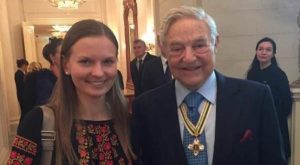
I'll add more in the next couple days.
Interesting. So, what was alleged as through a complex web of shell companies to be funding ODF was tied to now-dissolved companies around the time in 2018 when Kozlovska was denied entry at Brussels.
Here's more on the Kozlovska tie to Soros.
'Only NGOs Financed by Soros participated in Kozlovska's Bundestag meeting'
Only organisations funded by George Soros participated in a controversial meeting on Poland and Hungary in the German Bundestag, according to reports in the Polish media. The ‘In Politics’ website claims the meeting was attended by the Hungarian Helsinki Committee, Human Rights Watch and the Helsinki Foundation for Human Rights, all of which have received funding in recent years from George Soros and his Open Society Foundation.
Only organisations funded by George Soros participated in a controversial meeting on Poland and Hungary in the German Bundestag, according to reports in the Polish media. The ‘In Politics’ website claims the meeting was attended by the Hungarian Helsinki Committee, Human Rights Watch and the Helsinki Foundation for Human Rights, all of which have received funding in recent years from George Soros and his Open Society Foundation.
Kozlovska and Soros

I'll add more in the next couple days.
edit on 12-5-2019 by ucanthandlethetruth because: (no reason given)
edit on 12-5-2019 by
ucanthandlethetruth because: fixed
new topics
-
Dr. Demento
Music: 53 minutes ago -
The elephant in the room (wearing a hoodie)
US Political Madness: 59 minutes ago -
To become president, Zelensky had to learn Ukrainian
Political Conspiracies: 7 hours ago -
Green Grapes
General Chit Chat: 11 hours ago
top topics
-
Green Grapes
General Chit Chat: 11 hours ago, 6 flags -
To become president, Zelensky had to learn Ukrainian
Political Conspiracies: 7 hours ago, 5 flags -
Those Great Fresh Pet Commercials
Television: 16 hours ago, 3 flags -
The elephant in the room (wearing a hoodie)
US Political Madness: 59 minutes ago, 2 flags -
Dr. Demento
Music: 53 minutes ago, 0 flags
active topics
-
The elephant in the room (wearing a hoodie)
US Political Madness • 2 • : network dude -
Steering the Titantic from the Drydock.
Rant • 44 • : ufoorbhunter -
Los Angeles brush fires latest: 2 blazes threaten structures, prompt evacuations
Mainstream News • 121 • : Flyingclaydisk -
Dr. Demento
Music • 0 • : AlroyFarms -
Those Great Fresh Pet Commercials
Television • 5 • : CosmicFocus -
Planned Civil War In Britain May Be Triggered Soon
Social Issues and Civil Unrest • 23 • : AdultMaleHumanUK -
Those stupid GRAVITE commercials
Rant • 14 • : FlyersFan -
To become president, Zelensky had to learn Ukrainian
Political Conspiracies • 6 • : FlyersFan -
Green Grapes
General Chit Chat • 2 • : AlroyFarms -
Trump says ownership of Greenland 'is an absolute necessity'
Other Current Events • 66 • : bastion
